F = Open(File_path) Upload = Pickle.load(F) Exploit
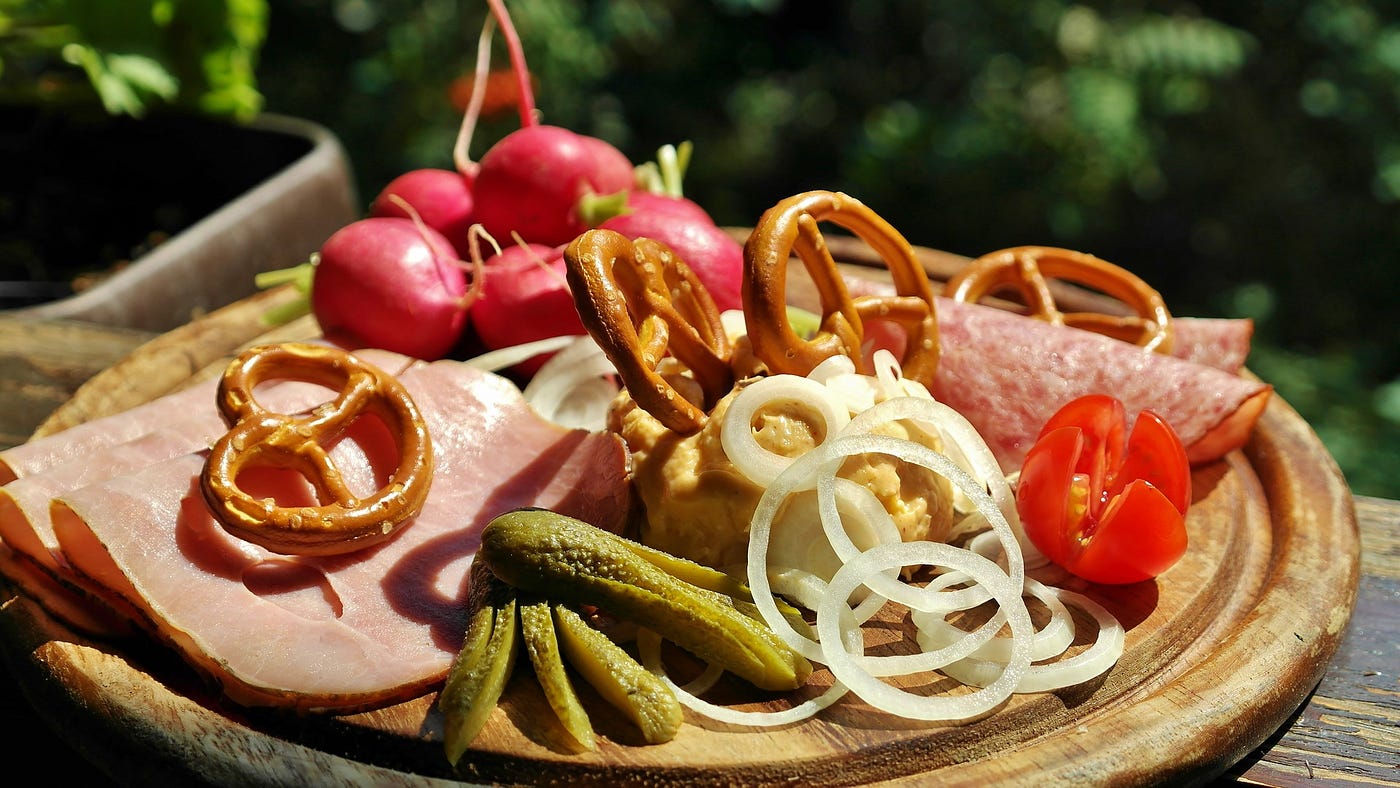
Exercise Not Utilise Python Pickle Unless You Know All These Points
Pros and cons of Pickle serialisation, and when should we use information technology
Compare with most of the other popular programming languages, Python probably has the most flexible serialisation of objects. In Python, everything is an object, so we tin can say that nearly everything can be serialised. Yes, the module that I was talking near is Pickle.
However, compared with other "regular" serialising approaches such equally JSON, Pickle has more aspects that need to exist conscientious when we use them. That's what the title said, do not utilize Pickle unless you lot know these facts.
In this commodity, I'll organise some of import notes almost Pickle and hope they volition help.
i. Basic Usage

By using the Python Pickle module, we can easily serialise almost all types of objects into a file. Before we can apply it, information technology needs to be imported.
import pickle Permit'southward take a dictionary as an case.
my_dict = {
'name': 'Chris',
'age': 33
} 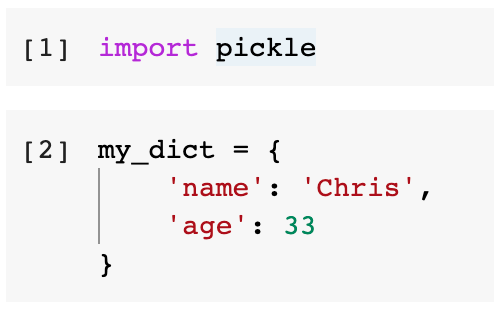
We can use the method pickle.dump() to serialise the dictionary and write information technology into a file.
with open('my_dict.pickle', 'wb') as f:
pickle.dump(my_dict, f) 
Then, we can read the file and load it back to a variable. After that, we accept the exact dictionary back. They are 100% identical in terms of content.
with open('my_dict.pickle', 'rb') every bit f:
my_dict_unpickled = pickle.load(f) my_dict == my_dict_unpickled
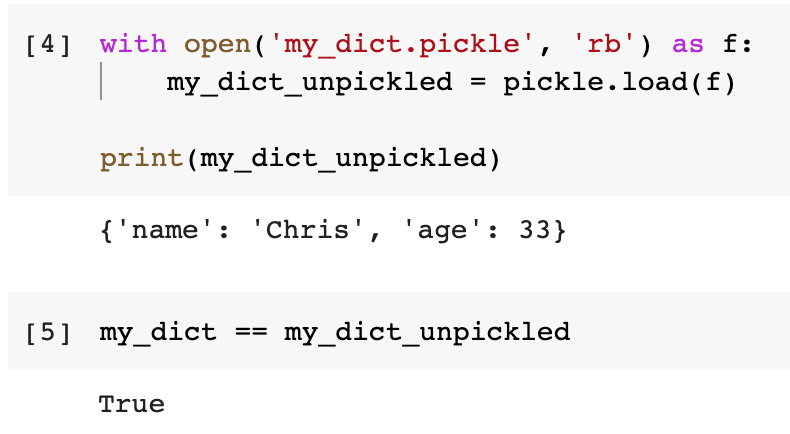
2. Why Pickle? What are the Pros and Cons?
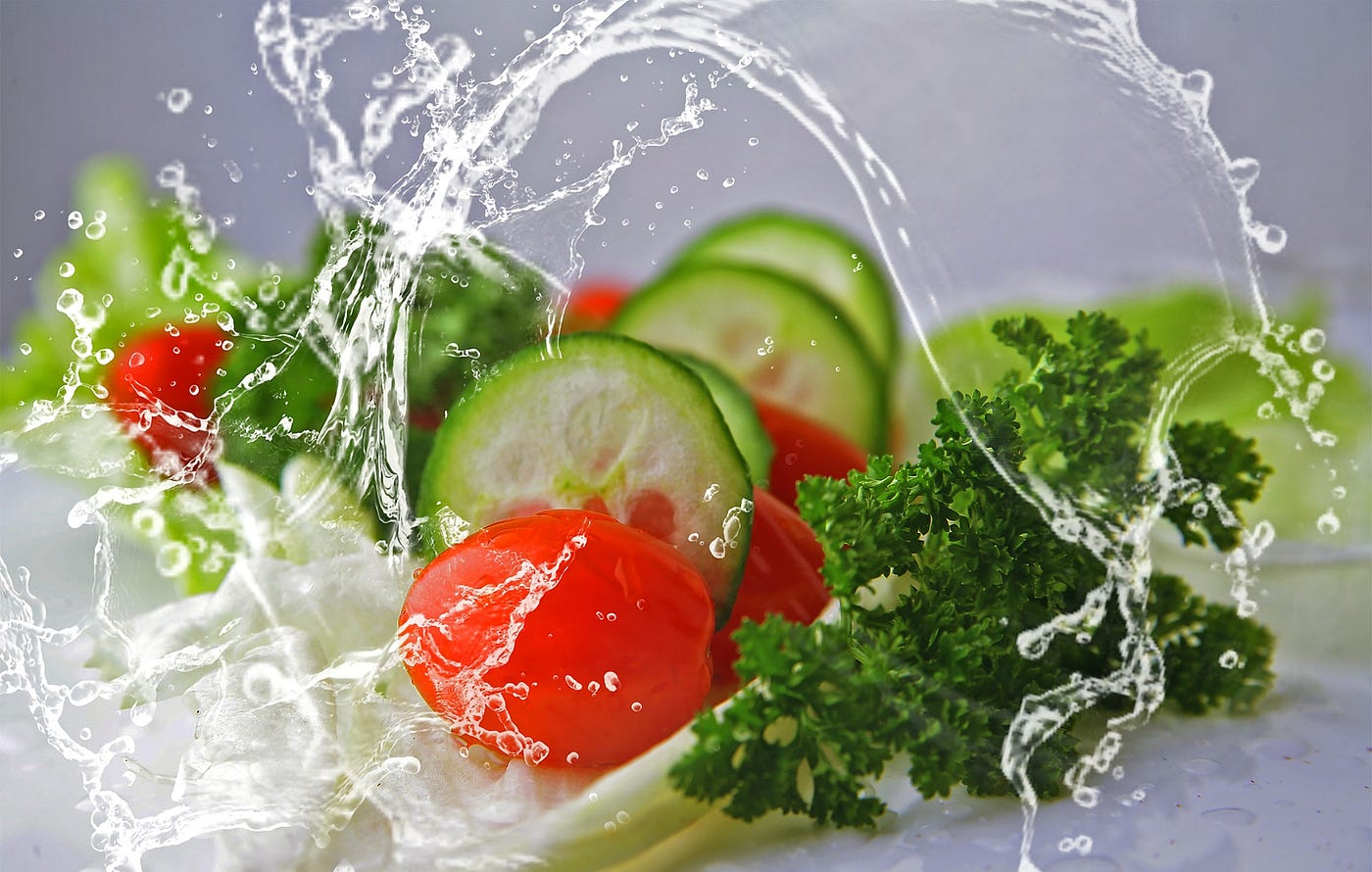
Indeed, at that place will exist more benefits if nosotros use JSON to serialise a Python dictionary in the instance above. In that location are mostly three main drawbacks to Pickle serialisation.
Cons-1: Pickle is Unsafe
Unlike JSON, which is just a slice of string, it is possible to construct malicious pickle data which will execute arbitrary code during unpickling.
Therefore, we should NEVER unpickle information that could have come from an untrusted source, or that could have been tampered with.
Cons-2: Pickle is unreadable
The about significant to serialising a Python dictionary to a JSON string is that the issue is human readable. Withal, that'southward non true for a Pickle file. Hither is the pickle file for the dictionary we've merely pickled. If nosotros attempt to open it as a text file, that'due south what we volition get.

Cons-3: Pickle is Limited in Python
A pickle object can only be loaded using Python. Other languages may be enabled to do then just crave 3rd party libraries to exist involved and may still not be perfectly supported.
In contrast, a JSON string is very commonly used in the programming world and is well supported past most programming languages.
Pickle's Pros
Pickle constructs arbitrary Python objects past invoking arbitrary functions, that's why it is non secure. Even so, this enables it to serialise about whatever Python object that JSON and other serialising methods volition non do.
Unpickling an object usually requires no "boilerplates". So, information technology is very suitable for quick and easy serialisation. For example, you can dump all the variables into pickle files and finish your program. Later on, you tin start another Python session and recover everything from serialised files. So, this enables us to run a piece of the program in a much more flexible way.
Another case will be multi-threading. When nosotros are using the multiprocess module to run a program in multiple threads, we tin can easily ship capricious Python objects to other processes or compute nodes.
In these scenarios, the security concern usually does not utilise, and humans won't have to read the objects. We just need quick, piece of cake and compatibility. In these cases, Pickle tin can be perfect to be utilised.
iii. What else can be pickled?

Well, I keep talking most virtually everything that tin can be serialised by Pickle. Now, allow me bear witness yous some examples.
Pickle a Function
The outset instance volition exist a function. Yes, we can serialise a function in Python, because a function is also an object in Python.
def my_func(num):
impress(f'my function will add 1 to the number {num}')
render num + 1 
Merely define a simple function for demo purposes. Now, allow's pickle it and load it into a new variable.
with open('my_func.pickle', 'wb') as f:
pickle.dump(my_func, f) with open('my_func.pickle', 'rb') every bit f:
my_func_unpickled = pickle.load(f) my_func_unpickled(ten)
The new variable can be used every bit a function, and the function volition exist identical to the original one.
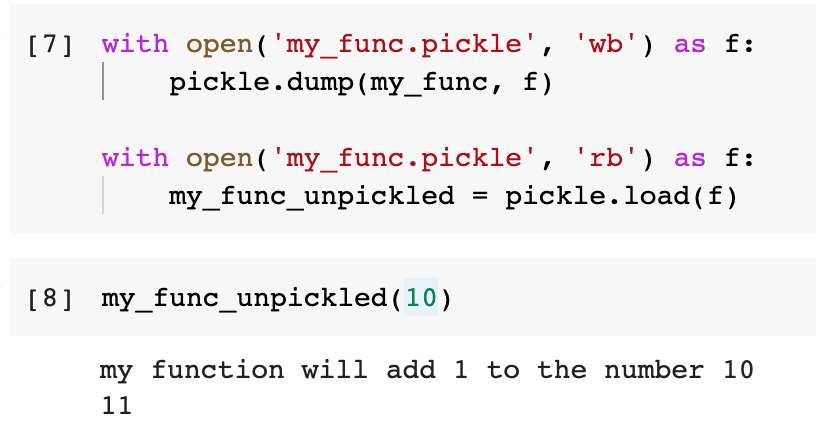
Pickle a Pandas Data Frame
Some other example volition be a Pandas information frame. Let's define a Pandas information frame.
import pandas as pd my_df = pd.DataFrame({
'name': ['Alice', 'Bob', 'Chris'],
'age': [25, 29, 33]
})
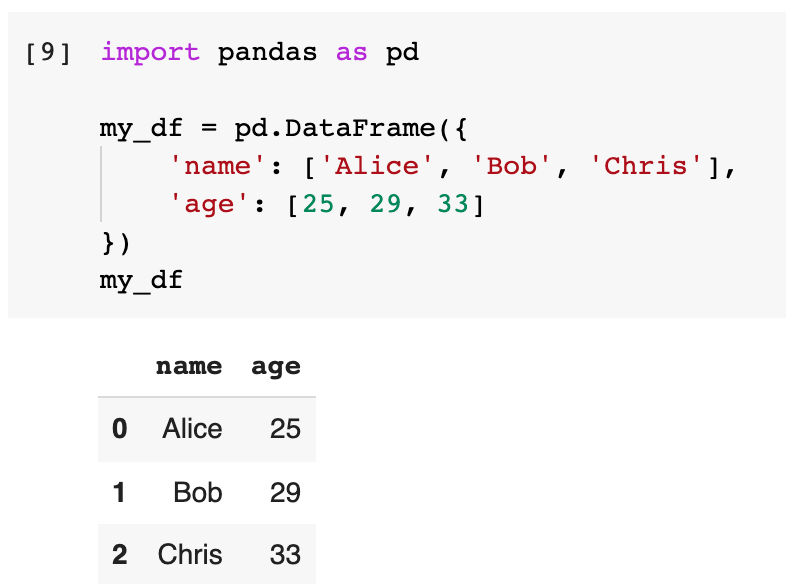
Now, we can pickle it and unpickle information technology to a new variable. The new DataFrame volition exist identical.
with open('my_df.pickle', 'wb') as f:
pickle.dump(my_df, f) with open('my_df.pickle', 'rb') as f:
my_df_unpickled = pickle.load(f)
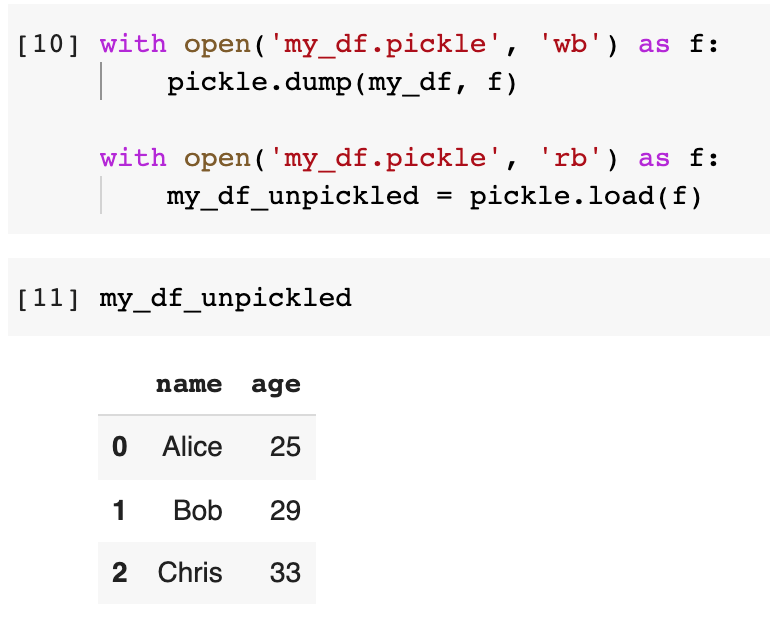
Please be advised that Pandas has built-in methods that can pickle and unpickle a data frame. They volition do the same job as above, just the code will be cleaner. The functioning is also identical.
Then, in that location might be a question, why we should use Pickle for a information frame rather than a CSV?
The showtime respond is speed. CSV is human-readable only information technology is near the slowest way to shop a Pandas data frame.
This SO post benchmarked the operation of unlike ways of serialising a Pandas data frame.
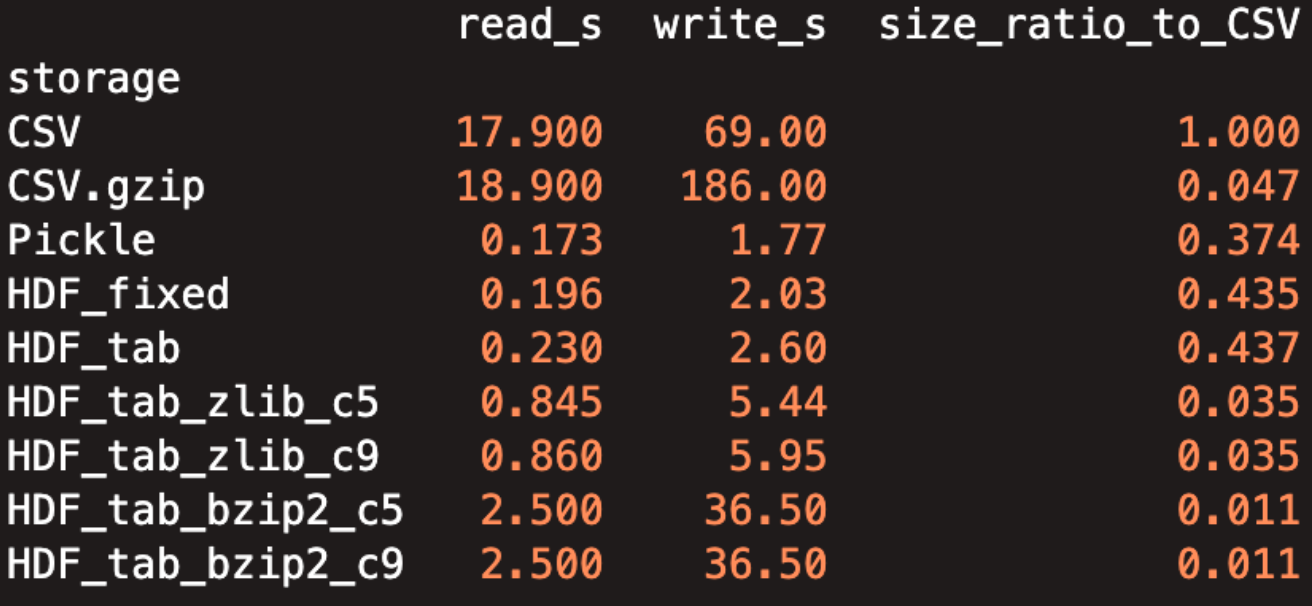
The second benefit for pickling a Pandas data frame is the data types. When we write a data frame to a CSV file, everything has to be converted to text. Sometimes, this volition crusade some inconvenience or trouble when we load it back. For example, if nosotros write a datetime cavalcade to CSV, we likely demand to specify the format string when nosotros load information technology back.
Notwithstanding, this effect doesn't exist for a pickle object. What yous pickled, y'all guaranteed to have the verbal aforementioned thing dorsum when yous load information technology. No need to practise anything else.
4. Pickle Protocol Version
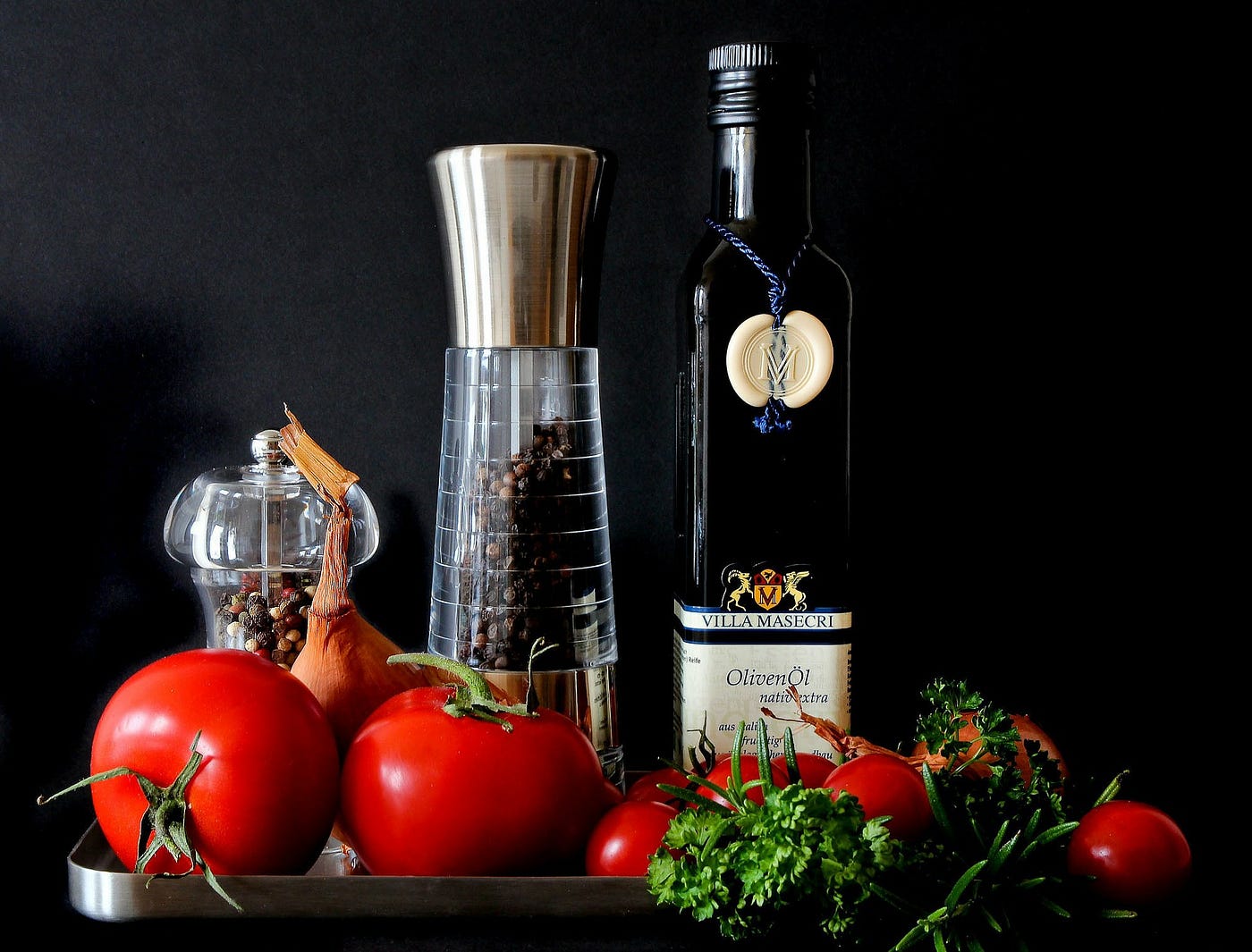
Information technology is quite common to use Pickle like what I did in the previous examples. They are not wrong, but it volition be swell if we can specify the protocol version of Pickle (ordinarily the highest). Simply speaking, the Pickle serialisation has different versions. Equally Python versions are iterating, the Pickle module is likewise evolving.
If you are interested what are the existing versions and what was improved, here is a list from the official documentation.
Protocol version 0 is the original "human-readable" protocol and is backwards uniform with before versions of Python.
Protocol version 1 is an old binary format that is likewise compatible with earlier versions of Python.
Protocol version ii was introduced in Python 2.3. It provides a much more efficient pickling of new-style classes.
Protocol version 3 was added in Python iii.0. It has explicit support for bytes objects and cannot be unpickled by Python ii.x. This was the default protocol in Python iii.0–three.seven.
Protocol version 4 was added in Python 3.4. It adds support for very large objects, pickling more kinds of objects, and some information format optimizations. It is the default protocol starting with Python iii.8.
Protocol version v was added in Python three.viii. Information technology adds support for out-of-ring information and speedup for in-ring data.
Generally speaking, the higher version is always ameliorate than the lower ones in terms of
- The size of the pickled objects
- The performance of unpickling
If we pickle the Pandas information frame using different versions, nosotros can see the deviation in size.
with open('my_df_p4.pickle', 'wb') as f:
pickle.dump(my_df, f, protocol=4) with open up('my_df_p3.pickle', 'wb') as f:
pickle.dump(my_df, f, protocol=3) with open up('my_df_p2.pickle', 'wb') as f:
pickle.dump(my_df, f, protocol=2) with open('my_df_p1.pickle', 'wb') as f:
pickle.dump(my_df, f, protocol=one)
import os print('P4:', os.path.getsize('my_df_p4.pickle')) impress('P3:', os.path.getsize('my_df_p3.pickle')) print('P2:', bone.path.getsize('my_df_p2.pickle')) impress('P1:', os.path.getsize('my_df_p1.pickle'))
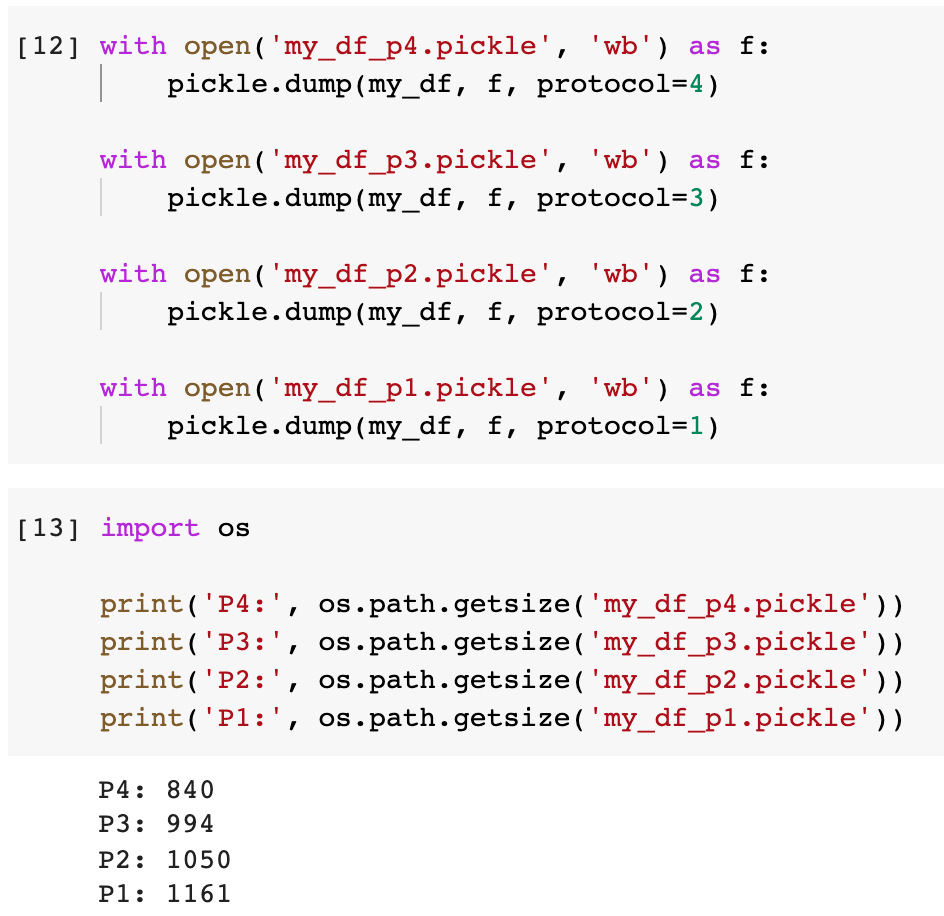
Why does Python even so reserve the old version while the new version is always better? That'south because the protocols are non e'er backwards uniform. That means, we have to choose a lower version if we want better compatibility.
However, if nosotros are using pickle objects without the need to exist backward compatible, nosotros can use the enumeration to guarantee our program use the latest one (the best one). Example as follows.
pickle.dump(my_df, f, protocol= pickle.HIGHEST_PROTOCOL) 5. Pickle a Custom Class
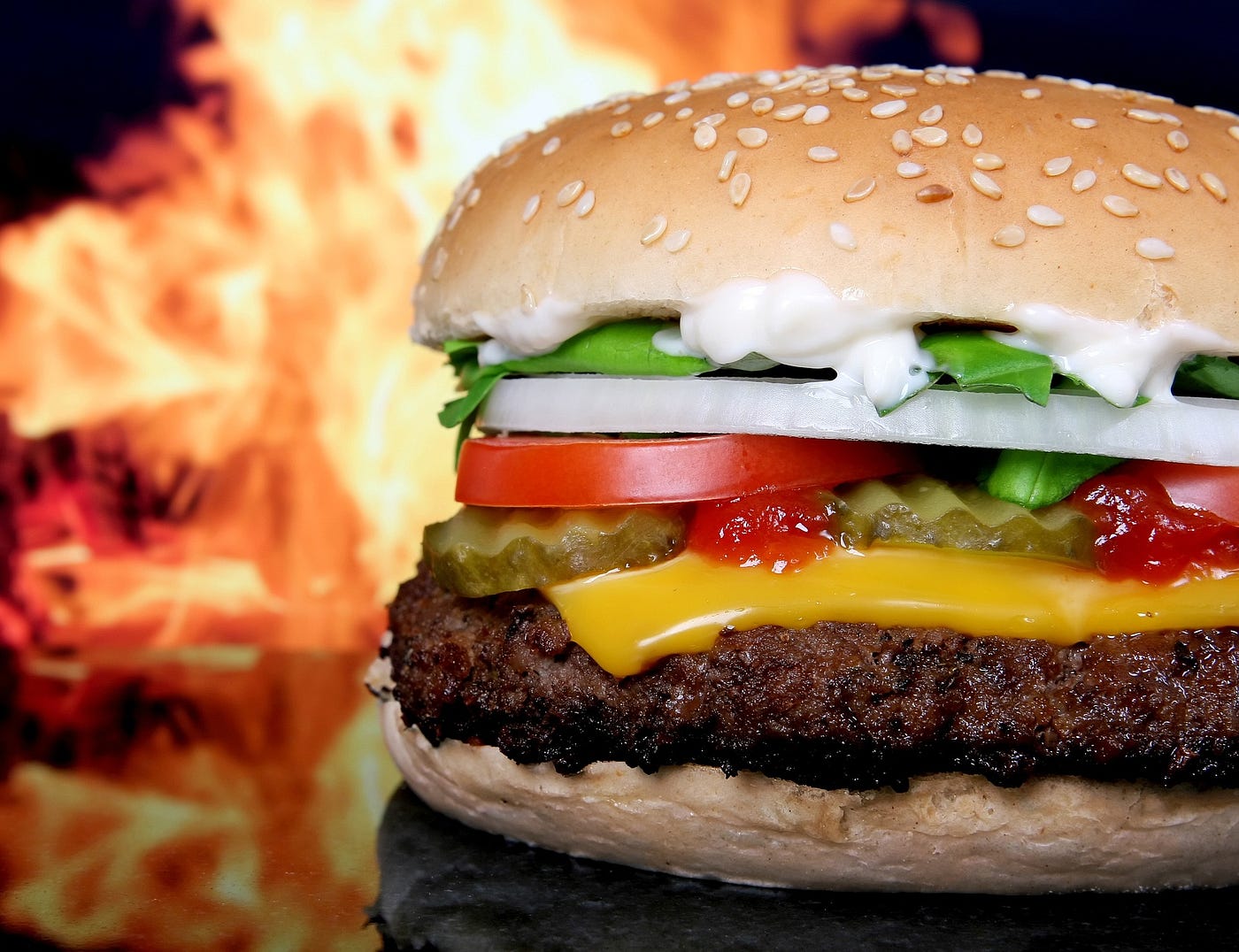
Although Pickle supports almost all the objects in Python, we still need to be careful when we pickle an object that was instantiated from a custom class. Briefly, the class needs to be existing when we load the pickled object back.
For example, let'due south define a simple class "Person" with two attributes and one method.
form Person:
def __init__(self, proper name, historic period):
self.proper noun = name
cocky.age = historic period def self_introduce(self):
print(f'My name is {self.proper noun} and my age is {self.historic period}') p = Person('Chris', 33)
p.self_introduce()

Now, allow's serialise the object "p" using Pickle.
with open('person.pickle', 'wb') as f:
pickle.dump(p, f) 
The issue will happen if the course does non exist. This will happen if we try to load the pickled object in a new session, and the class was not defined. We tin simulate this scenario by deleting the class definition.
del Person And then, if we try to load the pickled object back, there volition be an exception.
with open up('person.pickle', 'rb') as f:
p_unpickled = pickle.load(f) 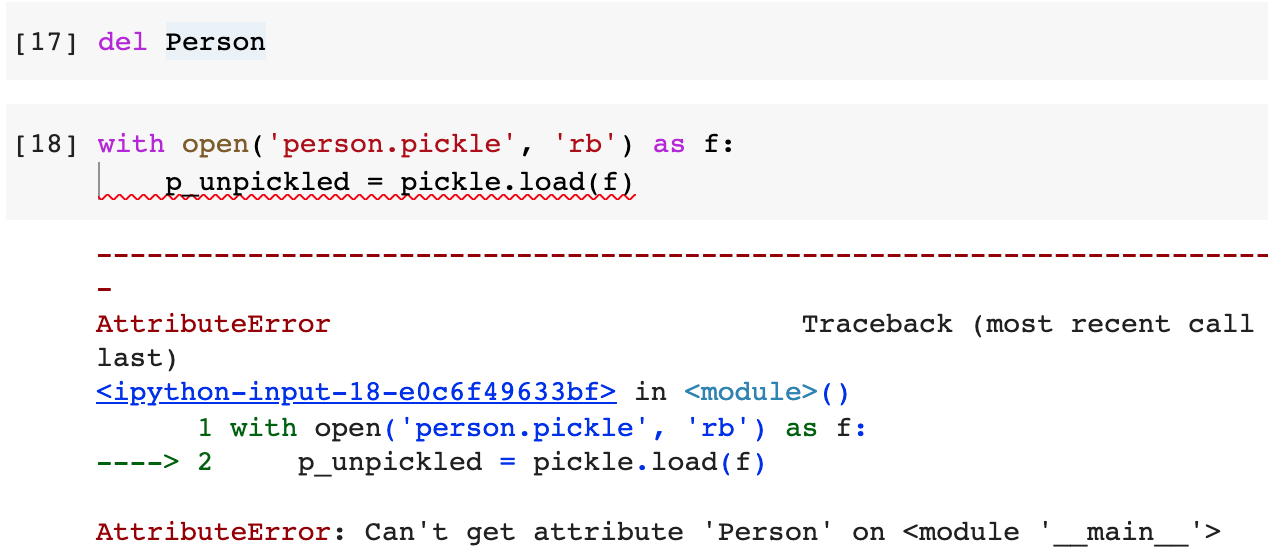
Therefore, nosotros need to make sure that the grade is existing when we load the object dorsum. Notwithstanding, if the definition of the course is slightly dissimilar, it might not cause problems just the behaviour of the object may be changed based on the new class definition.
course Person:
def __init__(cocky, proper noun, age):
self.name = name
self.historic period = historic period def self_introduce(self):
print(f'(Modified) My name is {self.name} and my historic period is {self.historic period}')
In the new form definition, I take modified the print message of the self-introduction method.

Then, if we load the pickled object back, in that location volition not be any errors, but the self-introduction method will differ from its original one.
with open('person.pickle', 'rb') as f:
p_unpickled = pickle.load(f) p_unpickled.self_introduce()

6. Non all objects tin be pickled
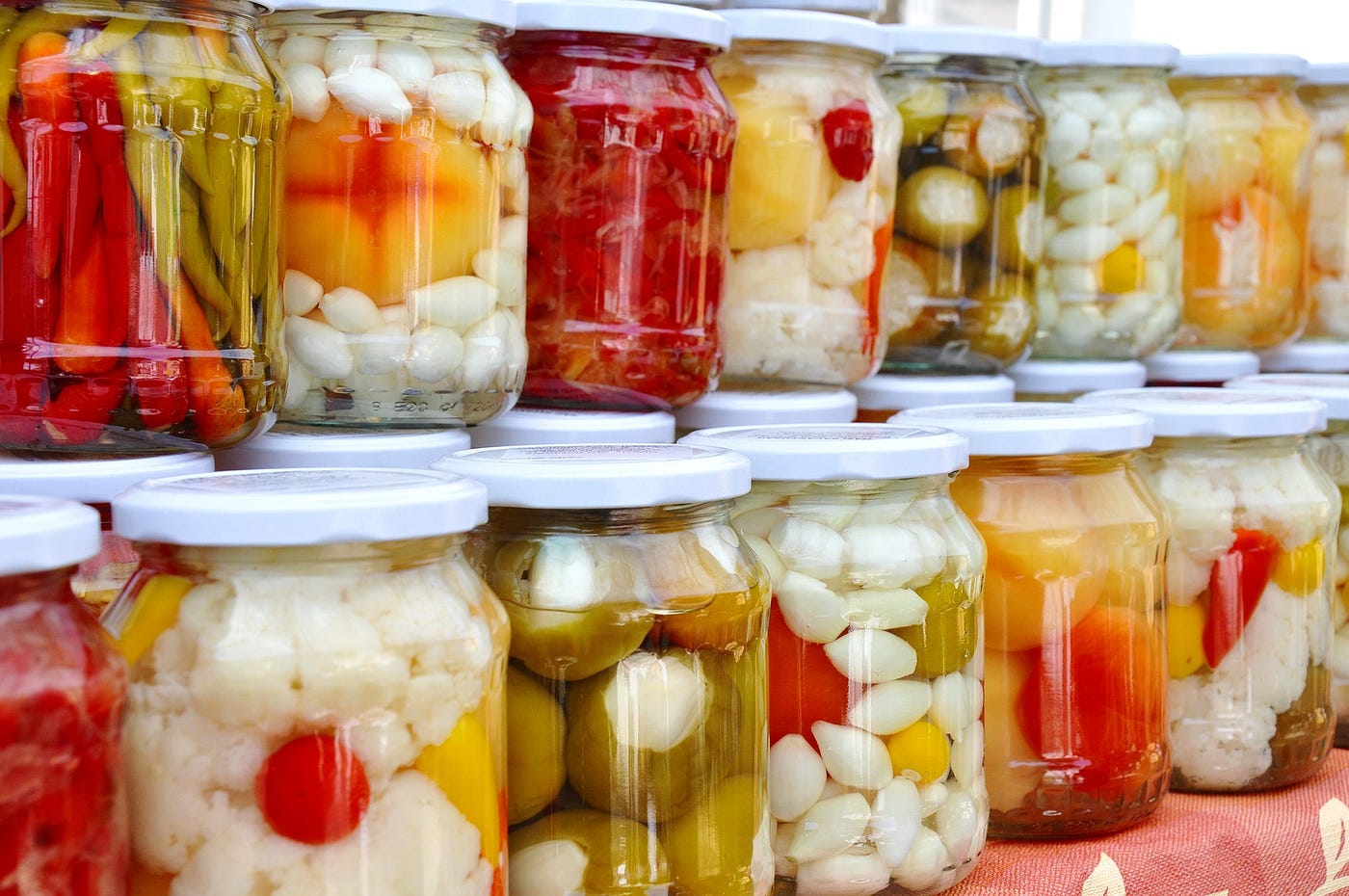
In this last section, I take to go back to my original statement "most all Python objects tin can be pickled". I apply "almost all" because there are still some types of objects that cannot be serialised past Pickle.
A typical blazon that cannot exist pickled will be the live connections objects, such as the network or database connections. That makes sense considering Pickle will non be able to plant the connection after information technology is closed. These objects can only exist re-created with proper credentials and other resource.
Another type that needs to be mentioned will be a module. An important module cannot be pickled also. Encounter the case below.
import datetime with open('datetime.pickle', 'wb') equally f:
pickle.dump(datetime, f)
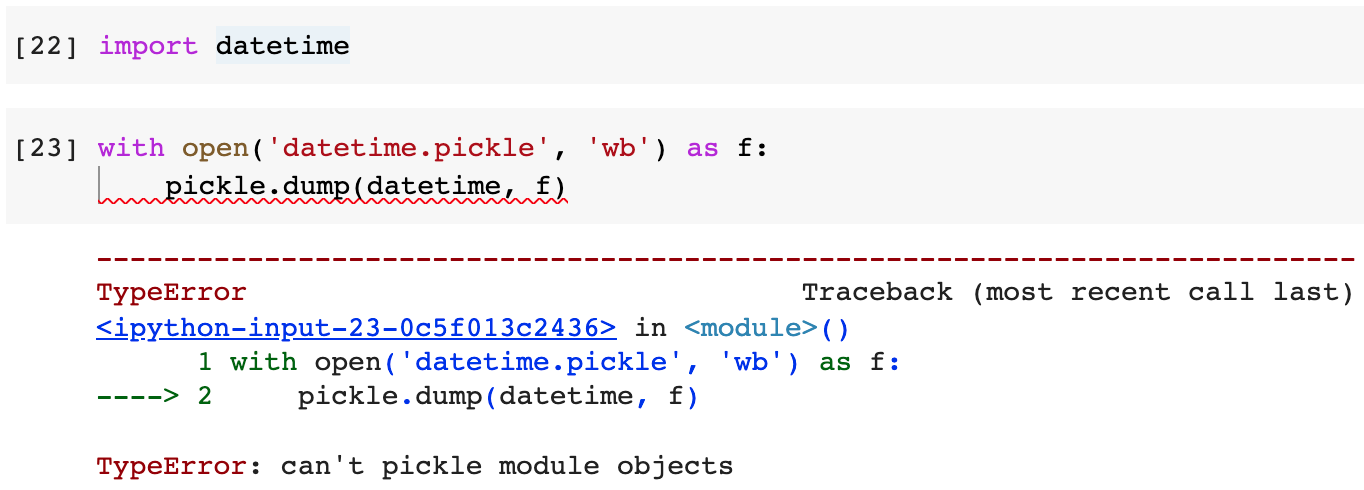
This is important to know because that means nosotros will not be able to pickle everything in global() since the imported module will be in there.
Summary

In this article, I have introduced the build-in serialisation method in Python — Pickle. Information technology tin can be used for quick and piece of cake serialisation. It supports almost all types of Python objects such as a part and even a Pandas data frame. When using Pickle for dissimilar versions of Python, we also demand to bear in heed that the versions of Pickle may also be different.
If you feel my articles are helpful, please consider joining Medium Membership to back up me and thousands of other writers! (Click the link above)
Source: https://towardsdatascience.com/do-not-use-python-pickle-unless-you-know-all-these-facts-d9e8695b7d43
0 Response to "F = Open(File_path) Upload = Pickle.load(F) Exploit"
Post a Comment